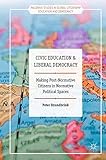Civic Education and Liberal Democracy [electronic resource] : Making Post-Normative Citizens in Normative Political Spaces / by Peter Strandbrink.
Material type: TextSeries: Palgrave Studies in Global Citizenship Education and DemocracyPublisher: Cham : Springer International Publishing : Imprint: Palgrave Macmillan, 2017Description: XIX, 232 p. online resourceContent type: text Media type: computer Carrier type: online resourceISBN: 9783319557984Subject(s): Education | Democracy | Educational sociology | Church and education | Education and sociology | Sociology, Educational | Education | Sociology of Education | Religion and Education | Democracy | Early Childhood EducationAdditional physical formats: Printed edition:: No titleDDC classification: 306.43 LOC classification: LC189-214.53Online resources: e-book Full-text access
TextSeries: Palgrave Studies in Global Citizenship Education and DemocracyPublisher: Cham : Springer International Publishing : Imprint: Palgrave Macmillan, 2017Description: XIX, 232 p. online resourceContent type: text Media type: computer Carrier type: online resourceISBN: 9783319557984Subject(s): Education | Democracy | Educational sociology | Church and education | Education and sociology | Sociology, Educational | Education | Sociology of Education | Religion and Education | Democracy | Early Childhood EducationAdditional physical formats: Printed edition:: No titleDDC classification: 306.43 LOC classification: LC189-214.53Online resources: e-book Full-text access | Item type | Current library | Collection | Call number | Copy number | Status | Notes | Date due | Barcode |
|---|---|---|---|---|---|---|---|---|
| E-Books | MEF eKitap Kütüphanesi | Springer Nature | LC189 -214.53 (Browse shelf (Opens below)) | Available | NATURE | 1419714-1001 |
Browsing MEF eKitap Kütüphanesi shelves Close shelf browser (Hides shelf browser)
1. Introduction -- 2. Civic Education and Liberal Democracy -- 3. Cultural Pluralism and Social Cohesion -- 4. Cosmopolitan and Parochial Value-Making -- 5. Tolerance in Civic and Religious Education -- 6. Education for the Good Life -- 7. Revisiting Civic Education and Liberal Democracy.
This book explores the inherent tension in civic education. There is a surging belief in contemporary European society that liberal democracy should work harder to reproduce the civic and normative setups of national populations through public education. The cardinal notion is that education remains the best means to accomplish this end, and educational regimes appropriate tools to make the young more tolerant, civic, democratic, communal, cosmopolitan, and prone to engaged activism. This book is concerned with the ambiguities that strain standard visions of civic education and educational statehood. On the one hand, civic-normative education is expected to drive tolerance in the face of conflicting good-life affirmations and accelerating worldview pluralisation; on the other hand, nation-states are primarily interested in reproducing the normative prerogatives that prevail in restricted cultural environments. This means that civic education unfolds on two irreconcilable planes at once: one cosmopolitan/tolerant, another parochial/intolerant. The book will be of significant interest to students and scholars of education, sociology, normative statehood, democracy, and liberal political culture, particularly those working in the areas of civic education; as well as education policy-makers.
5







